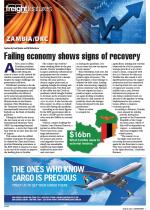As demand in Zambia increases, the need for more truck stops and fuel depots has grown.According to William Esterhuizen, regional manager for Zambia at Korridor, the company is in the process of building a new fuel depot and truck park in Lusaka, as well as one in Kapiri Mposhi.“There has been a huge demand for truck yards in Zambia as the number of transporters has grown. Our current yard in Lusaka has just become too small, hence the decision to upgrade and expand the facility to accommodate more vehicles.”On completion, this facility would be able to accommodate at least 250 trucks at any given time, said Esterhuizen.“It is not just about a lack of truck yards but also about yards that are well maintained and operated. We are overrun by truckers as the facilities we provide are of a high standard. Not only are our yards safe and secure, but there are proper ablutions for the truckers, canteens, and areas where they can relax and rest before dr iv ing on.”Esterhuizen said Korridor had seen ongoing growth in Zambia and the Democratic Republic of the Congo. Korridor is in the process of opening a new branch at the Sakania border post between these two countries. This is a strategic move to support the rerouting of traffic from the congested Kasumbalesa border post to Sakania.Helping alleviate pressure into DRC“Border post congestion into the DRC remains a massive challenge. At times we have seen queues of up to 78km at the border post, and easing this pressure is essential. Therefore, moving some of this traffic to Sakania will help alleviate some of this pressure.”Esterhuizen said the company was also expanding its office at the Kasumbalesa border post, as it had reached maximum capacity with its current facility.“There is a lot of activity in the DRC and Zambia, due to increase in demand for minerals such as cobalt and copper,” he told Freight News.“The rising fuel price is, however, a concern. It has a direct impact on logistics costs, especially in these landlocked countries.”He further explained that infrastructure remained another challenge in both countries, although road upgrades were starting to become a priority.“In the DRC, in particular, there has been a lot of development in the Kolwezi region. At the new Sakania border post there is also quite a bit of activity happening, including with regard to the road infrastructure.”Esterhuizen said this was good news considering that road freight remained the primary mode of transport in both countries. “There is some rail capacity, but for the most part both these countries are dependent on road transport and will be for a long time to come.”Expanding presenceWorking in the DRC and Zambia requires certain robustness along with reputable partners on the ground. “We understand the challenging environment and have been operating in these countries for over 15 years. We are expanding our presence because there is increased demand for our experience and knowledge.”He said attributes such as dependability and reliability were critical in the DRC and Zambia. “With that in mind transparency and visibility are critical in these markets. With our solutions, transport operation managers can see exactly what is happening with their vehicles and drivers, no matter where they are.”Reducing fees for transportersAccording to Esterhuizen, through its approach of working directly with the various government institutions in countries, Korridor has managed to reduce fees for transporters, and in some instances halved their fees. “Using our platform, transport companies can reduce their costs considerably. Our model requires us to have an extensive footprint, hence our ongoing investments and extensions in sub-Saharan Africa to ensure we keep up with the increased demand for our services.”He said the outlook for Zambia and the DRC remained extremely positive. “We are continuously expanding our footprint into new areas in the DRC and Zambia. Any place where trucks are delayed or congested is where we want to be to try and ease the pain for our customers.”The current Korridor platform will be expanded to include all foreign-registered vehicles. At present the company is running a pilot project at the Nakonde, Kasumbalesa, Mwami and Chanida borders for all foreign-registered vehicles. “Once the pilot is completed, we will roll this out further across Zambia,” said Esterhuizen. “Korridor, through its extensive network and unique online platform, continues to provide advanced, seamless, and transparent solutions to simplify all our customers’ en-route and cross-border requirements, allowing our customers to plan, order, track and manage expenses on its online platform.

